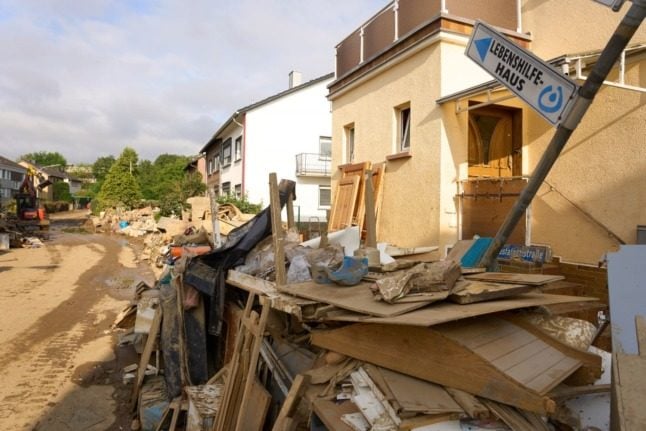A deluge of rain fell over western Germany over two days last week, sending torrents of water rushing down streets, sweeping away trees, cars and sheds, and destroying swathes of housing.
Many victims have been found dead in sodden cellars after attempting to retrieve valuables, while others were swept away by the sheer force of the water.
Emergency workers have been out in force to assess damaged buildings, clear debris and restore gas, electricity and telephone services.
In some areas, police have deployed speedboats and divers to retrieve bodies.
READ ALSO: German floods – what went wrong?
A total of 117 people are now confirmed to have died in Rhineland-Palatinate state, a police spokesman told AFP, with 47 victims in neighbouring North Rhine-Westphalia (NRW) and one in Bavaria.
“We haven’t been to all the houses yet, we must assume that we will find more bodies,” said Rhineland Palatinate’s regional interior minister Roger Lewentz.
The number of people missing remains unclear, mainly because of disrupted communication networks.
Police in Koblenz said they were still trying to locate 170 people in Rhineland-Palatinate, after managing to get through to several hundred residents who were earlier reported missing.
The situation was similar in NRW, where police said they had been able to contact more than 700 residents who were initially unreachable. Several dozen remain missing.
IN PICTURES: The aftermath of Germany’s catastrophic floods
German Interior Minister Horst Seehofer and Armin Laschet, the head of North Rhine-Westphalia state and the frontrunner to succeed Angela Merkel as chancellor, on Monday visited Euskirchen, one of the worst-affected towns.
Emergency aid
The disaster has catapulted climate change to the top of the agenda in Germany, ahead of September 26 polls that will mark the end of Merkel’s 16 years in power.
READ ALSO: Why have the floods in Europe been so deadly?
Experts say that because a warmer atmosphere holds more water, climate change increases the risk and intensity of flooding from extreme rainfall.
Heavy rainfall has also battered southern Germany, as well as Belgium, Switzerland, Luxembourg, the Netherlands and Austria in recent days.
At least 31 people have died in Belgium.
The high death toll has also brought scrutiny to Germany’s weather alert system and whether people in the risk zones were notified early enough. The government on Monday vowed to improve the system.
Merkel’s cabinet plans to approve an emergency aid package for flood victims on Wednesday, expected to total around 400 million euros ($470 million). The final bill is likely to be in the billions.
READ ALSO: German flood disaster: What went wrong?



 Please whitelist us to continue reading.
Please whitelist us to continue reading.
There was a casualty in Erzgebirge, Saxony…